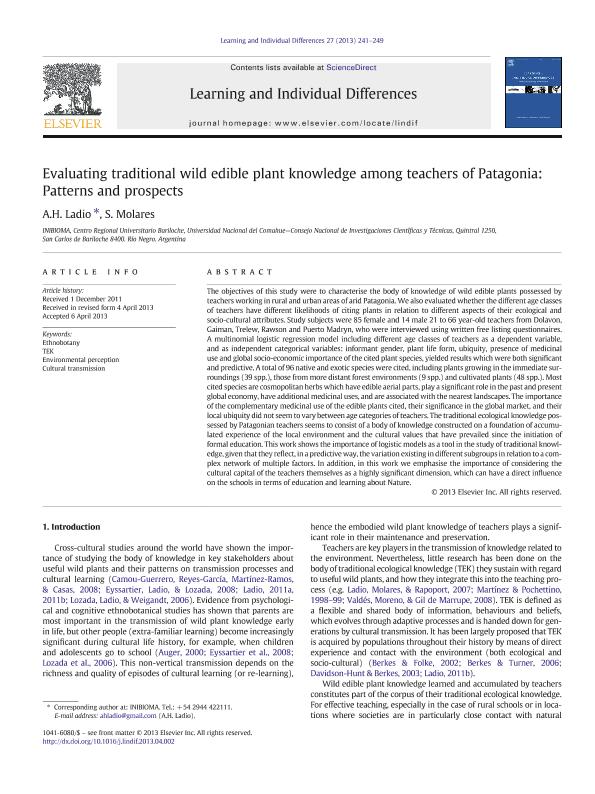Mostrar el registro sencillo del ítem
dc.contributor.author
Ladio, Ana Haydee

dc.contributor.author
Molares, Soledad

dc.date.available
2016-02-05T20:21:50Z
dc.date.issued
2013-04-28
dc.identifier.citation
Ladio, Ana Haydee; Molares, Soledad; Evaluating traditional wild edible plant knowledge among teachers of Patagonia: patterns and prospects; Elservier; Learning and Individual Differences; 27; 2013; 28-4-2013; 241-249
dc.identifier.issn
1041-6080
dc.identifier.uri
http://hdl.handle.net/11336/4090
dc.description.abstract
The objectives of this study were to characterise the body of knowledge of wild edible plants possessed by teachersworking in rural and urban areas of arid Patagonia. We also evaluated whether the different age classes of teachers have different likelihoods of citing plants in relation to different aspects of their ecological and socio-cultural attributes. Study subjects were 85 female and 14 male 21 to 66 year-old teachers from Dolavon, Gaiman, Trelew, Rawson and Puerto Madryn, who were interviewed using written free listing questionnaires. A multinomial logistic regression model including different age classes of teachers as a dependent variable, and as independent categorical variables: informant gender, plant life form, ubiquity, presence of medicinal use and global socio-economic importance of the cited plant species, yielded results which were both significant and predictive. A total of 96 native and exotic species were cited, including plants growing in the immediate surroundings (39 spp.), those from more distant forest environments (9 spp.) and cultivated plants (48 spp.). Most cited species are cosmopolitan herbs which have edible aerial parts, play a significant role in the past and present global economy, have additional medicinal uses, and are associated with the nearest landscapes. The importance of the complementary medicinal use of the edible plants cited, their significance in the global market, and their local ubiquity did not seemto vary between age categories of teachers. The traditional ecological knowledge possessed by Patagonian teachers seems to consist of a body of knowledge constructed on a foundation of accumulated experience of the local environment and the cultural values that have prevailed since the initiation of formal education. This work shows the importance of logistic models as a tool in the study of traditional knowledge, given that they reflect, in a predictive way, the variation existing in different subgroups in relation to a complex network of multiple factors. In addition, in this work we emphasise the importance of considering the cultural capital of the teachers themselves as a highly significant dimension, which can have a direct influence on the schools in terms of education and learning about Nature. ©
dc.format
application/pdf
dc.language.iso
eng
dc.publisher
Elservier
dc.rights
info:eu-repo/semantics/openAccess
dc.rights.uri
https://creativecommons.org/licenses/by-nc-sa/2.5/ar/
dc.subject
Ethnobotany
dc.subject
Tek
dc.subject
Environmental Perception
dc.subject
Cultural Transmission
dc.subject.classification
Otras Ciencias Sociales

dc.subject.classification
Otras Ciencias Sociales

dc.subject.classification
CIENCIAS SOCIALES

dc.subject.classification
Ciencias de las Plantas, Botánica

dc.subject.classification
Ciencias Biológicas

dc.subject.classification
CIENCIAS NATURALES Y EXACTAS

dc.title
Evaluating traditional wild edible plant knowledge among teachers of Patagonia: patterns and prospects
dc.type
info:eu-repo/semantics/article
dc.type
info:ar-repo/semantics/artículo
dc.type
info:eu-repo/semantics/publishedVersion
dc.date.updated
2016-03-30 10:35:44.97925-03
dc.journal.volume
27
dc.journal.number
2013
dc.journal.pagination
241-249
dc.journal.pais
Estados Unidos

dc.journal.ciudad
New York
dc.description.fil
Fil: Ladio, Ana Haydee. Consejo Nacional de Investigaciones Científicas y Técnicas. Centro Científico Tecnológico Patagonia Norte. Instituto de Investigación En Biodiversidad y Medioambiente; Argentina
dc.description.fil
Fil: Molares, Soledad. Consejo Nacional de Investigaciones Científicas y Técnicas. Centro Científico Tecnológico Patagonia Norte. Instituto de Investigación En Biodiversidad y Medioambiente; Argentina
dc.journal.title
Learning and Individual Differences
dc.relation.alternativeid
info:eu-repo/semantics/altIdentifier/doi/http://dx.doi.org/10.1016/j.lindif.2013.04.002
dc.relation.alternativeid
info:eu-repo/semantics/altIdentifier/url/http://www.sciencedirect.com/science/journal/aip/10416080
Archivos asociados
